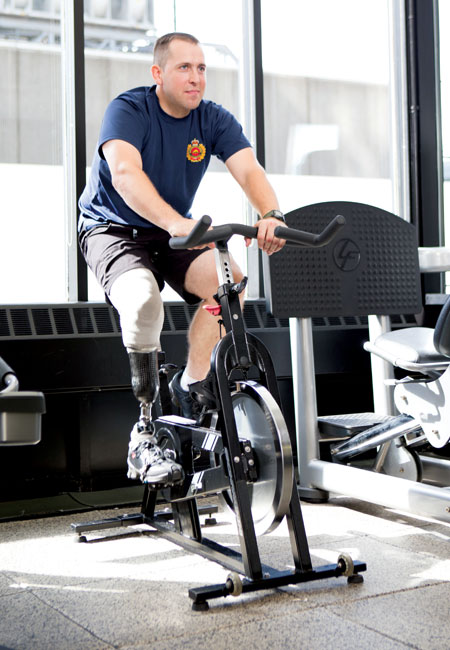A Voice for Veterans
Advocating for veterans’ rights and interests is a cornerstone of The War Amps work to this day.

Afghanistan war amputee Maj. Blaise
The War Amps continues to be the leader in advocating for veterans’ rights and legislation, as well as the driving force behind the National Council of Veteran Associations in Canada (NCVA). Throughout the pandemic, we have continued to demand legislative reform to satisfy the financial needs of veterans and their dependants.
The core premise of our position is that the Government must create a comprehensive program model that treats all veterans with parallel disabilities in the same manner as to the application of benefits and wellness policies. The War Amps is represented on four of the six ministerial advisory groups to Veterans Affairs Canada (VAC), co-chairing two of these advisory committees.
Calling for fast-tracking of veterans’ disability claims
This year, The War Amps made a number of submissions to the Minister of Veterans Affairs and senior VAC officials along with a significant media campaign concerning the financial and emotional toll the pandemic has taken on veterans struggling with mental and physical injuries. We argued that, since the Government can fast-track millions of claims for assistance related to COVID-19, the same should be done for those injured while serving in uniform.
The fundamental recommendation of The War Amps and the NCVA was that VAC needed to adopt the position that veterans’ claims should be taken at face value. Decisions should be based on the reasonable evidence provided by the veteran and his or her family, with the proviso that individual files could be monitored over time and “spot audits” carried out to address any potential abuses.
We argued that there must be recognition of the clear reality that medical reports usually required by VAC to support these claims have been almost impossible to obtain during the pandemic.
VAC’s policy statement in July 2020 adopted a number of our proposals but ultimately failed to effectively remedy the backlog crisis at the time, which had only been intensified by the pandemic. As we stated in our submission to the Standing Committee on Veterans Affairs in November 2020, the scope and pace of these initiatives required a higher priority from the Government in order to establish a more immediate resolution for veterans and their families, often facing severe financial insecurity during the pandemic.
Our advocacy efforts on this issue resulted in significant media attention including a Canadian Press article that was published in the Globe and Mail and other national publications, as well as an op-ed for the Hill Times by Brian Forbes, chairman of The War Amps Executive Committee and of the NCVA. We also communicated with modern-day veterans and their families to keep them informed of updates on this matter throughout the pandemic.
A major breakthrough
In December, we achieved substantial progress and indeed, a major potential breakthrough with respect to our crusade to compel VAC to take innovative and creative steps to alleviate the unacceptable backlog/turnaround times for veterans’ disability claims.
The Standing Committee on Veterans Affairs issued its report “Clearing the Jam: Addressing the Backlog of Disability Benefit Claims at Veterans Affairs Canada” on December 11, following many months of study and stakeholder input.
The Standing Committee findings identified quite clearly the crisis in VAC adjudication and called for urgent and dramatic change in departmental protocols. Most importantly from The War Amps and the NCVA’s perspective, the report endorses our position that a form of automatic entitlement/pre-approval, together with fast-track protocols, needs to be adopted by the department to address this significant challenge.
Adopting these measures would exhibit good faith in dealing with the existing backlog and would uphold the fundamental principle that has guided all Canadian veterans compensation programs since the First World War: the benefit of the doubt. The War Amps continues to underline this basic philosophy and reassure veterans and their families that their well-being should be the sole and unique purpose of VAC.
As we have said all along, desperate times require bold and creative measures. Veterans deserve nothing less during these challenging times when financial and health concerns have been intensified by COVID-19.
We will continue to press the department to expedite the implementation of the necessary changes outlined by the Standing Committee report.
Pushing for meaningful improvements to veterans legislation
The War Amps and the NCVA continue to advocate for improvements to existing veterans legislation for the well-being of veterans and their dependants. We have made a number of recommendations to the Minister of Veterans Affairs and senior VAC officials to address the discrimination and inequity (the “elephant in the room”) that exists with respect to the financial compensation available to disabled veterans and their families under the traditional Pension Act and the New Veterans Charter/Veterans Well-being Act (NVC/VWA).
We urge VAC, working together with relevant ministerial advisory groups and other veteran stakeholders, to create a comprehensive program model that would essentially treat all veterans with parallel disabilities in the same manner as to the application of benefits and wellness policies. This would result in the elimination of artificial cut-off dates that arbitrarily distinguish veterans based on whether they were injured before or after 2006. Our financial comparison graphs illustrate the discrepancy between the Pension Act and NVC/VWA, and show what the NCVA’s proposed program model would look like for both moderately and seriously disabled veterans.
The War Amps and the NCVA continue to press the Government to implement a better compensation/wellness model that combines the best parts of the Pension Act and the best parts of the New Veterans Charter/Veterans Well-being Act for all disabled veterans in Canada.